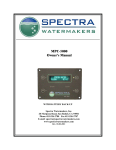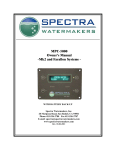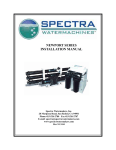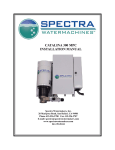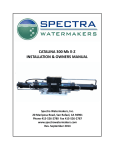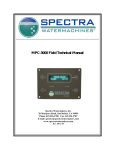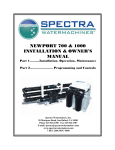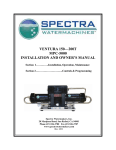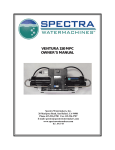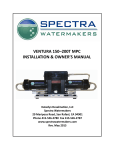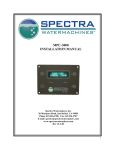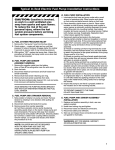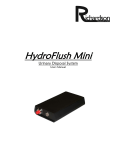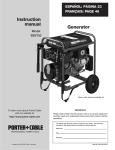Download MPCa31-mk2 Manual.pub
Transcript
MPC-5000 -Mk2 Field Technical Manual Spectra Watermakers, Inc. 20 Mariposa Road, San Rafael, CA 94901 Phone 415-526-2780 Fax 415-526-2787 E-mail: [email protected] www.spectrawatermakers.com Rev. 04-24-06 2 Spectra Watermakers MPC-5000-MK2 Field Technical Manual Revision A31 03-29-06 This manual is intended for use by Spectra Watermakers Field Service Technicians as a technical reference document. Its goal is to contain the necessary information as to be of value to field technicians addressing installation of hardware and software, system configuration, and system troubleshooting. In the event that necessary information is not contained in this document, call Spectra Watermakers at (415) 526-2780. Table of Contents: Programming from the Display…………………………………………………………………. 5 Software Installation.. ………………………………………………………………………….. 8 Software Features ………………………………………………………………………………. 15 Computer Settings ……………………………………………………………………………… 17 Rotor Flow Meter Operation …………………………………………………………………… 18 Salinity Probe Calibration ……………………………………………………………………… 19 Tank Switch Operation and Installation ……………………………………………………….. 20 MPC-5000 -MK2 Operation Guide (Jumper G/M on mode) …………………………………. 21 Detailed MPC– Control Data…………………………………………………………………….30 3 4 Programming from the Display The MPC-5000 MK2 controls can be programmed directly from the display as well as from a computer. To enter Program Mode the System must be in “Standby Mode” To enter “Standby Mode” Press the “Stop” button from any other mode. The display will read SPECTRA WATERMAKERS A-xx. If it is desired to have the machine running during the programming process, start it in the normal way and then put the manual switch in the “Run Manual” position. Then push the “Stop” button. The machine will continue to run but the controls will go into Standby Mode. To Enter “Program Mode” push and hold the “Stop” and “Alarm/Display” buttons at the exact same time. Hold them down for 4 seconds. If the control does not display “System Units” try again until the display reads “System Units” After entering “Program Mode” the buttons on the Display will have different secondary functions as Follows: Alarm Display: Scroll through the various programming windows by pressing “Alarm Disp” Stop: Selects the digit in the roto flow meter calibration constant window that is to be changed. Has no function in other windows. Auto Run: Changes the selected parameter down one unit per push. Auto Store: Changes the selected parameter one unit up with each push. To Exit Program Mode: Press and release the “Stop” and “Alarm Disp” buttons simultaneously. The control will automatically revert from Program Mode to Standby Mode if no buttons are pushed for 30 seconds. The programming windows and their functions: SYSTEM UNITS Select Imperial (gallons, psi) or Metric (liters, bar) by pressing “Auto Run” or “Auto Store” FLOW SENSOR TYPE Select Rotoflow or Stroke Sensor with the “Auto Run” or Auto Store” buttons PRESSURE RANGE For watermakers with 0-250 psi pressure sensors select High. For all other systems select Low. DISABLE AIR LOCK THIS IS A SAFETY SHUTDOWN. SELECT “NO”. Do not select “Yes” unless the system is shutting down on a “System Stalled” alarm due to a failed Rotor flow meter. 5 DISABLE PREFILTER: THIS IS A SAFETY SHUTDOWN. SELECT “NO”. Select “Yes” only if you are getting a FALSE “Service Prefilters” alarm. DISABLE PRESSURE: THIS IS A SAFETY SHUTDOWN. SELECT “NO”. Select “Yes” only if you are getting a FALSE “High Pressure” alarm. DISABLE SALINITY: This function allows you to run the watermaker in the event of a salinity probe, probe cable, or salinity sensing circuit failure. If you get a “Salinity Probe Failed” Alarm or the salinity reading cannot be properly calibrated using the “Salinity Cal” function, select “Yes” to continue making water. WARNING: When ”YES” is selected the diversion valve will be energized whenever the watermaker is running. All product water will be sent to the vessel’s water tank regardless of its quality. Before disabling the Salinity Probe test the product water carefully. PPM THRESHOLD: Set this parameter to the desired product water reject salinity. The diversion valve will send water to the water tank when the product parts per million is lower than this set point and reject the product overboard when the salinity is higher than the set point. Factory default setting is 750ppm LOW VACUUM LIMIT: Set point for the Maximum allowable pressure drop through the prefilters. If the Inlet Pressure reading drops below this setpoint the unit will alarm “Service Prefilter” and slow down to Run Low Speed. If the pressure drops below this setpoint in Run Low Mode it will alarm Service Prefilters again and shut down. This setpoint is in absolute pressure. This setpoint is also the “Replace” end of the Prefilter Condition bar graph. In most cases this parameter should be set to “10”. PRESSURE LIMIT: If the pressure at the feed pump discharge exceeds this set point the unit will shut down and alarm “High Pressure.” The left hand number on the display is the real time feed pressure. The number on the right is the High Pressure limit. Factory default set point varies by model. See the “Computer Settings” for the correct settings for your unit. FLOW CONSTANT: The flow constant calibrates the product flow reading. The number on the left is the real time flow reading and the number on the right is the flow constant. The flow constant is set by selecting the desired digit to be changed by pushing the “Stop Button” until the digit to be changed is flashing. Push “Auto Run” to decrease the value or “Auto Store to increase the value. Then select the next digit to be changed with the “Stop” button. The flow constant is most easily adjusted with the watermaker running on the “Run Manual” switch. Measure the product flow using a graduated container and a stop watch. Adjust the flow constant until the flow reading matches the measured flow. The flow reading is heavily damped and will take some time to stabilize after changes are made to the constant. Use 25,000 as a starting point for rotor flow meters and 6,000,000 for stroke sensors. SALINITY CAL: This window is used to calibrate the salinity sensor. The number on the left is the real time salinity reading and the number on the right is the calibration setting. Increase the setting to raise the reading. See the Salinity Probe Calibration Instructions for details. 6 INLET OFFSET: This parameter calibrates the Feed Pressure sensor found on the 20 micron filter housing. The number on the left is the real time pressure reading and the number on the left is the Offset. This reading is in absolute pressure. The reading can be increased or decreased by putting a positive or negative number in the Offset setting. OUTLET OFFSET: Outlet Offset calibrates the sensor on the outlet of the feed pump which is used to determine feed pressure and to set off the “High Pressure” alarm. The number on the left is the real time pressure reading and the number on the left is the Offset in psi or bar. BRIGHTNESS: Four brightness levels can be selected if the unit is equipped with an adjustable Fluorescent display. Change the parameter with the Auto Store button to select the desired level. FLUSH DURATION: This parameter sets the length of the fresh water flush in minutes. It should be set to equal the sum of twice the pump off time plus the pump on time. PUMP ON TIME: Sets the length of time the feed pump will run during the flush. Set this parameter to the time in seconds that it takes for fresh water to begin to come out of the brine discharge during the flush. PUMP OFF TIME: Sets the time in seconds that the flush valve is open, but the feed pump is not running, at the beginning and end of the flush cycle. During the pump off time flush water flows backwards through the prefilters and sea strainer, filling them with fresh water and removing some of the material they trapped. FLUSH INTERVAL: This is the time in hours between automatic flushes when the system is in “Auto Store” mode. Factory default is five days (120 hours). CLEAN PRESSURE: This should be set to the pressure seen at the Inlet Sensor when the system is running with brand new filters. After installing new filters, run the machine on manual, using the Run Manual switch, and set the right hand number to match the real time pressure shown on the left. This pressure reading is in absolute pressure. This parameter sets the “Clean” end if the prefilter condition bar graph. 7 Software Installation from CD: 1) Insert the Spectra Watermakers CD-ROM into the computer’s CD-ROM drive. 2) Using “My Computer” or Windows Explorer, locate and double-click the “setup.exe” file on the CDROM drive. This will begin the installation process. Follow the on-screen instructions. 3) When the software is installed, it will open from the “Start → Programs” menu 4) Before using the software, your MPC-5000 -MK2 circuit board must be connected to your computer’s COM port using a standard RS-232 serial cable (NO crossovers on cable). 12V or 24V DC power must be applied to the MPC-5000 -MK2 board, and the board must be on before the software can communicate with it. The software may not run if these steps are not taken. You will get an error message if there is a COM port conflict. 5) If you have no serial port available, you may purchase a USB-to-serial port adapter. Once the software has been installed, open the directory where it was installed, locate and double-click the “spectra.exe” file to run the program. To reset the COM port, follow the directions beginning on page 5. When the software is opened and the watermaker is connected, you will see this window: 8 MPC Software Port Settings Start → Settings → Control Panel → System Choose the “Hardware” tab and click on “Device Manager” 9 Open the “Ports” group Ports → Communications Port The above picture shows the alternative USB-to-serial device in the device manager. It’s located under the same group of ports. The way to setup the COM port will be the same as it is to set the serial-to-serial communication port, which is as follows: Right-click on the correct port for your system and choose Properties. Click on Port Settings → Advanced. 10 For serial-to-serial communication, select COM port 2, 3, or 4 For USB-to-serial communication, select COM port 2, 3, or 4, but make sure that the assigned port number will not duplicate your serial port number if your computer has a serial port. Click OK and close all the windows. Open Windows Explorer. If you don’t know how to do this, right-click on Start and choose “Explore”. Navigate to your “Program Files” folder. Find the “Spectra” folder. Inside, find and open “spectra.ini”. 11 Change the number on the first row to be the same as the number of the COM port you chose, then save and close the file. Now we’re ready to run the software. Start → Programs → Spectra This is the programming window. 12 13 14 Software Features: 1) Show/Hide LCD Data & Show/Hide System Parameters: Clicking on these fields will toggle between a settings window to allow you to change what is displayed on the control Panel and a settings window for changing the system parameters. Show LCD Data allows you to customize the display for another language if desired. Select the line to change, enter a new caption for that line, and hit change. There are limits to how many characters are allowed. Contact the factory before making changes in this window. Show/Hide System Parameters Will display the window for changing items 12 through 24 as shown on the previous page. 2) Port: Allows you to select which COM port on your computer will communicate with the MPC-5000 -MK2 board via RS-232 serial cable. 3) Inlet Pressure: Displays real-time system pressure at the feed pump inlet. This figure is in absolute pressure. (Psia) Atmospheric pressure will read 14.7psi or 1.0 bar. 4) Outlet Pressure: Displays real-time pressure at the Clark Pump Inlet. This reading is in gauge pressure. (Psig) Atmospheric pressure will read 0.0 psi (bar). 5) Hours: Displays total hours the MPC-5000 -MK2 has been run. 6) Manual, Auto, Flush, A.Flush, Timer: These are simply display lights to show which mode the MPC-5000 -MK2 is currently in. The timer will display any countdown time for the current mode. 7) Rate GPH: Real-time meter showing gallons or liters per-hour product. 8) Salinity: Real-time meter showing salinity measurement of product water in parts-per-million. 9) Fresh Water Tank 1, Fresh Water Tank 2, Sea Strainer: Display lights to indicate state of tank switches. Sea Strainer switch is not used in this mode. 10) Pump1, Pump2, Dvlv, Fvlv, Pvlv, Aux1, Aux2, Aux3, Ster: Display lights to indicate output states of the MPC board. 11) Battery Voltage: Displays current DC voltage applied to the MPC board. 12) Rotor Flow Meter: Check this box if a rotor flow meter is to be used. Refer to “Rotor Flow Meter Operation” section later in this manual. 13) Metric: Check box to change display units of measurement from English to metric. 14) PPM Threshold: Default at 500 ppm, Sets the reject salinity level of product water. This is currently factory set at 750 PPM. (Above 750ppm product is rejected, below 750ppm it is accepted and diverted to holding tank). 15) PSI Limit: Used to set the maximum allowable system pressure, measured at the feed pump outlet. See “Computer Settings” for default settings for each model. 16) PSI Low Vacuum Limit: Set point for the Maximum allowable pressure drop through the prefilters. If the Inlet Pressure reading drops below this setpoint the unit will alarm “Service Prefilter” and slow down to Run Low Speed. If the pressure drops below this setpoint in Run Low Mode it will alarm Service Prefilters again and shut down. This setpoint is in absolute pressure. This setpoint is also the “Replace” end of the Prefilter Condition bar graph. 17) Flow Constant: This parameter is used to calibrate the product flow rate reading. Raising the constant lowers the reading. 18) Inlet & Outlet Offset: Used to calibrate the pressure transducers if necessary. 19) 250 PSI Transducers: Check this box if a 0-250psi transducer is used. If a 0-150psi transducer is used do not check this box. 20) Clean Filter Pressure: This should be set to match the pressure shown in the Inlet Pressure field when the prefilters and sea strainer are absolutely clean. This setting is compared to the Psi Low Vacuum Limit to generate the “Good” end of the Prefilter Condition bar graph. 15 21) Flush Duration: Flush duration will be the sum of the Pump on time plus 2X Pump Off time. In order to flush properly the Flush Duration must be set the same as or higher than the total flush time required for two Pump Off times and one Pump on time. 22) Flush Period: In hours, the period of time between flushes, while in Auto Flush Mode. Typically 120 hours. (5 days) 23) Pump On/Off Time: In seconds, the amount of time the pump will be turned on or off during a fresh water flush cycle. When a flush cycle starts, the flush valve will open immediately, but the feed pump will remain off for the Pump Off Time, then start up. The feed pump will run for the Pump On Time, then stop for the remainder of the flush. During the Pump Off Time the flush water backflushes the prefilter and sea strainer to ensure that the entire system is stored full of fresh water. 24) Change Hours: Just in case you want to roll back your odometer. 25) Read/Write: Click Read to update the Operational Conditions in the upper half of the window. Click Write to upload changes to the System Parameters lower half of the window to the microprocessor. Changes will not take effect until Write is clicked. 26) Disable Airlock Fault: Check this box to override System Stalled automatic shutdowns. System Stalled alarms whenever the controls are seeing zero product flow. If the system is operating properly and product is being made, but the system is shutting down on a false System Stalled alarm, use this box to continue operating. Do not use this override if the feed pump is getting air bound and the Clark Pump is actually stalling as the feed pump will be damaged. 27) Disable Prefilter Fault: Check this box to override false Service Prefilter alarms. Monitor prefilter condition carefully when this alarm is overridden. If the prefilters get dirty the system will not shut down. Instead the feed pump will cavitate and be quickly damaged. 28) Disable Probe Fault: Check this box to override Salinity Probe Failed alarms and shutdowns. When this box is checked the diversion valve will be energized at all times the system is making water regardless of product quality. All water produced will go to the tank. Test the product frequently to ensure that the watermaker is making good quality water. 29) Disable high pressure Fault: Check this box to override High Pressure false alarms. Do not check this box until the actual feed pressure has been proven to be normal and the alarm is false. 30) Brightness: This field shows the brightness setting of the fluorescent display. 31) Salinity Calibration: This constant calibrates the salinity probe. Raising the constant increases the salinity reading. Abbreviations: DVlv: Diversion Valve FVlv: Fresh Water Flush Valve PVlv: Priming Valve Aux1: Auxiliary Contact One: The following pages describe the function of each of the buttons and fields in the Spectra MPC-5000 -MK2 programming window. 16 Computer Settings: These are typical computer settings for standard Spectra systems. Unless otherwise specified, all other values remain the default values. Change the settings in the programming boxes as shown for each model. Ventura: Max Pressure: 125 Low Vacuum Limit: 10 Pump On Time: 120 Pump Off Time: 20 Catalina 300 Max Pressure: 125 Low Vacuum Limit: 10 Pump On time: 180 Pump off time:20 Newport Mag: (12 and 24v DC) Max pressure: 150 Low Vacuum Limit: 10 Pump On Time:180 Pump Off Time: 20 These are factory defaults. Pump on time, pump off time, flush duration, and feed pump flush speed should be adjusted to optimize the flush cycle for minimum water consumption and to ensure that no sea water is drawn in during the flush. Newport 400 AC Version: Max Pressure: 150 Low Vacuum Limit: 10 Pump On Time: 180 Pump Off Time: 20 Newport 700: Max Pressure: 200 Low Vacuum Limit: 10 Pump On Time: 240 Pump Off Time: 20 Newport 1000 Max Pressure: 250 Low Vacuum Limit: 10 Pump On Time: 300 Pump Off Time: 20 REV 4-01-04 17 Rotor Flow Meter: We are currently shipping our watermakers with Gems brand rotor flow meters. A rotor flow meter is a pinwheel device with a hall-effect sensor built in, installed in line with product water output from the reverse osmosis (RO) membrane. When water passes through the meter, it spins the pinwheel; the hall-effect sensor picks up the motions of the pinwheel and sends the frequency of the spinning pinwheel to the MPC board. The MPC board then calculates, based on a “meter constant”, the gallon-per-minute output of product water, thereby eliminating the need for a stroke sensor. The rotor flow meter uses the same three terminals on the MPC-5000 -MK2 circuit board as the stroke sensor. When programming a watermaker with a rotor flow meter, the “Rotor Flow Meter” check box must be checked. The “Flow Constant” field will then read a default constant which can be adjusted up or down to calibrate the product flow reading on the display. Start with a setting of 25,000. Run the watermaker with the product going into a measured container instead of the tank and time the product flow. Adjust the roto flow constant up or down until the display reads the same as the actual measured flow. 18 Salinity Probe Calibration Salinity is a measurement of dissolved solids in liquid: these solids will conduct electricity to varying degrees. A special probe is used, with two electrical contacts in it, to determine the resistance to the flow of electricity in the liquid. The higher the resistance, the lower the PPM of dissolved solids. In the Spectra Watermakers systems, the salinity probe is located just before the diversion valve, at the output of the RO membrane. This way we can look at the salinity level of the product water before deciding to either reject the water or accept it and divert it into the holding tank. The salinity level in parts-per-million can be seen either through the salinity meter in the software, or on the display. The next step is to decide what medium to use as calibration solution. If a hand-held salinity meter is available, you can simply take a reading of your product water while the unit is running, then calibrate our MPC board to match that reading. As long as you trust the accuracy of your hand-held meter, this is all that is necessary. The electronic salinity circuit can be adjusted from the Spectra software by adjusting the “Salinity Calibration” parameter, or from the display in the “Salinity Cal” window. Increase the calibration parameter to increase the salinity reading. Conductivity calibration solutions are available from Spectra Watermakers if another method of calibration is necessary. These solutions are pre-made potassium chloride solutions with known salinity levels. Calibration consists of inserting the probe into the solution and setting the calibration parameter to the required value. To remove the salinity probe, unplug the telephone style cable from the probe. Use a wrench to unscrew the probe from the diversion valve assembly. Re-connect the salinity probe cable, and you are ready to calibrate. Place the flat surface of the probe containing the two metal conductivity contacts into the calibration solution being careful not to get the cable or jacks wet. Upon re-installation, it is recommended to use Teflon tape on the salinity probe threads before re-installing to prevent leaks. We also recommend putting some silicone grease inside the jack, to prevent moisture inside the jack. 19 Tank Switch Installation and Operation: There are two sets of terminals on the MPC-5000 -MK2 PCB that can be used in four different configurations to automatically start and stop the watermaker, or to automatically stop the watermaker when the tank(s) are full without the “Auto Start” feature. These terminals are on the green ten-pin connector and are labeled “Float Switch 1” and “Float Switch 2.” Float Switch 1 is the tank full switch, and Float Switch 2 is the tank empty switch. If the unit is wired for both auto-start and auto-stop, it can be put into auto-fill mode by pushing and holding the “Auto Run” switch on the MPC-5000 -MK2 display. In this mode, the watermaker will start whenever the water level drops below the tank empty switch, thus opening it (breaking the circuit). When the tank fills up and both the tank full and tank empty switches have remained closed for two minutes, the watermaker will shut down and flush itself. The water maker will then start back up when the water level drops below the tank empty switch and it remains open for 2 minutes. This configuration allows for completely automatic operation. If the watermaker does not need to start up within five days, it will automatically do a fresh water flush. Auto-fill mode can be ended by pushing the “Stop” button or the “Auto Flush” button. If the watermaker is in auto-run mode it can be put into auto-fill mode without stopping it by holding down the “Auto Run” button. If the owner prefers to install the automatic shutoff feature without the automatic start up option, only the tank full switch is used. A jumper must be placed between the tank empty terminals (Float Switch 2) in place of the tank empty switch, because the watermaker will only shut down if both sets of terminals are closed. To use this mode, the watermaker must be started up with the “Stop/Start” button or the “Auto Run” button. After the unit starts up, press and hold the “Auto Run” button until the display reads “Auto Fill Mode”. The watermaker will fill the tank and automatically enter auto-flush mode. It is possible to use the auto-fill feature with two tanks. A double-throw electrical switch must be installed in a convenient location. If only the single tank full switch is installed in each tank, connect the wire from Float Switch 1, terminal 1 to the common on the switch and run separate wires from the switch to each tank switch. The second wires can both be run to Float Switch 1, terminal 2. If you are using two switches in each tank, you will need a double-pole, doublethrow switch. 20 Spectra MPC-5000 -MK2 Operation Guide Jumper On Mode This document is a basic outline of MPC-5000 -MK2 mode operations. It details what is seen on the LCD display, what outputs are active during run-time, and how the different modes work together. This mode (two pump mode) is used on watermakers having two feed water pumps, a boost pump and a feed pump. The MPC-5000 -MK2 will be in two pump mode if the JP2 pins on the MPC-5000 -MK2 printed circuit board are jumped together. In this mode the feed pump has two RUN speeds. When the system is started it will be in RUN HIGH Mode and the feed pump will Run at its higher run speed. If the Inlet Pressure drops below the Low Vacuum Limit because the feed water prefilters get dirty or for any other reason, the system will go into RUN LOW mode and the feed pump will slow to its lower run speed. 21 Power On Power On Initial Startup Purge Mode Auto Run or OPEN PRESSURE RELIEF VALVE NOW STARTING 00:30 All Off, Aux1 On Pump2, Fvlv, Pvlv, Aux1, Aux2, Stop Purging PURGING STORAGE SOLUTION 18:30 Pump2, Aux1, Aux2 Countdown to 0:00 Done CLOSE PRESSURE RELIEF VALVE NOW All Off, Aux1 On Close pressure relief valve and press Auto Run Auto Run RUN AUTO MODE 1:00 Pump2, Pvlv, Aux1, Aux2, Ster Displayed for 10 secs Priming Making Water Bypass Purge Mode Auto Run and PURGING PRODUCT 10:00 RUN AUTO MODE 00:59 HOURS Pump1, Pump2, Aux1, Aux2, Aux3, Ster Pump1, Dvlv*, Aux1, Aux2, Aux3, Ster PURGE MODE BYPASSED Stop Simultaneously 22 Manual Run Mode Stop RUN HIGH MODE Pump2, Fvlv, Pvlv, Aux1, Aux2, Aux3, Ster Displayed for 20 secs Priming Making Water STARTING 00:09 GPH PRODUCT 17.2 Pump2, Fvlv, Pvlv, Aux1, Aux2, Aux3, Ster Pump1, Dvlv*, Aux1, Aux2, Aux3, Ster *NOTE: If salinity is out of tolerance, the diversion valve will close, and the “reject” LED will be lit. Salinity must drop below tolerance diversion valve will open. Press Low Mode Start Stop RUN HIGH MODE Pump2, Fvlv, Pvlv, Aux1, Aux2, Aux3, Ster Then press again Start Stop ...and hold for 5 seconds RUN LOW MODE Pump2, Fvlv, Pvlv, Aux1, Aux2, Aux3, Ster Displayed for 20 secs STARTING 00:09 GPH PRODUCT 08.5 When 30 seconds remaining, Pump2 Off, Pump1 On Pump1, Dvlv*, Aux1, Aux2, Ster 23 Auto Run Mode Auto Run RUN AUTO MODE 01:00 HOURS Pump2, Fvlv, Pvlv, Aux1, Aux2, Aux3, Ster Note: pressing “Auto Run” again will add time in 1 hour increments Priming 30 seconds Making Water STARTING 00:09 RUN AUTO MODE 0:59 HOURS Pump2, Fvlv, Pvlv, Aux1, Aux2, Aux3, Ster Pump1, Dvlv*, Aux1, Aux2, Aux3, Ster Countdown to 0 Flush FRESH WATER FLUSH 5:00 Fvlv, Aux1, Aux2 (Pump off) Pump2, Fvlv, Pvlv, Aux1, Aux2, (Pump On) Fvlv, Aux1, Aux2 (Pump off) Countdown to 0 Storage FLUSH TIMER INTERVAL 119:59 Aux1 Countdown to 0 Perform Flush Cycle Repeats Note: Pump2 flush on/off times (seconds), as well as storage time (hours), are programmable via internal software Storage Mode Auto Store Flush Storage STARTING 5:30 FRESH WATER FLUSH 5:00 FLUSH TIMER INTERVAL 119:59 Pump2, Fvlv, Pvlv, Aux1 Pump2 Cycles On/Off* Fvlv, Aux1 Aux1 Countdown to 0, repeat flush. Cycle repeats. 24 Press and hold Auto Fill Mode AUTO FILL MODE Auto Run Pump2, Pvlv, Aux1, Aux2, Ster For 5 seconds STARTING 1:30 AUTO FILL MODE When 30 seconds remaining, Pump2 Off, Pump1 On Pump1, Pump2, Dvlv*, Aux1, Aux2, Ster Will produce water until tank 1 switch closes Auto Fill Mode If Tank1 (max) Tank/s Full Switch closes.. TANK/S FULL STARTING TANK/S FULL Pump2, Fvlv, Pvlv, Aux1 5:30 FRESH WATER FLUSH 5:00 Pump2 Cycles On/Off* Fvlv, Aux1 Display will toggle “Tank/s Full” to “Fresh Water Flush” every 5 seconds Countdown to 0 TANK/S FULL FLUSH TIMER INTERVAL 119:59 Aux1 Display will toggle “Tank/s Full” to “Flush Timer Interval” every 5 seconds Countdown to 0 If timer reaches zero, another fresh water flush will be performed If tank 2 (min) switch opens, the timer will interrupt, and the unit will go back into auto-fill mode (production mode) 25 Run-time Readouts Alarm Disp Pressing “Alarm/Disp” at any time during run cycle will cycle through the following readouts: GPH PRODUCT 4 □□□□□□□□□□□□ 22 Push and hold Alarm Disp Converts to Metric Metric LPH PRODUCT 15 □□□□□□□□□□□□ 68 Metric FEED WATER BAR 3 □□□□□□□□□□□□ 9 SALINITY LOW □□□□□□□□□□ HIGH FEED WATER PSI 50 □□□□□□□□□□□□ 150 PREFILTER GOOD □□□□□□ REPLACE HOURS TOTAL 000000 26 If inlet pressure > max pressure (150 psi for Newport systems) HIGH PRESSURE Shutdown, Audible Alarm Alarm LED lit If stroke not sensed for 30 seconds: RERE-STARTING 2:00 Pump1 Off, Pump2 On Countdown to 0, retry previous mode If still no stroke RERE-STARTING 2:00 Pump1 Off, Pump2 On Countdown to 0, retry previous mode If still no stroke SYSTEM STALLED Shutdown, Audible Alarm Alarm LED lit 27 If DC Input voltage too low: VOLTAGE TOO LOW Begin FWF Mode To Shutdown If DC input voltage too high: VOLTAGE TOO HIGH If salinity probe bad or disconnected: If blown fuse SALINITY PROBE FAILED CHECK FUSE X Begin FWF Mode To Shutdown Shutdown Shutdown (Where ‘x’ represents number of blown fuse (1-5)) If Tank1 AND Tank2 switch closed for 2 minutes: TANK/S FULL Depending on operating mode, system may at this point begin a fresh water flush, begin storage mode, or shut down. Refer to “Operating Modes”. 28 If salinity above tolerance: If salinity above tolerance for 20 minutes:: Shutdown Reject lamp lit, 20 minute internal counter begins SALINITY HIGH FLUSH 5:00 SALINITY HIGH Dvlv Off Begin FWF Mode Audible Alarm Alarm LED lit Aux1 29 Detailed MPC Controls Data CONTENTS HARDWARE DESCRIPTION…… …………………………………………………….……………..2 INPUTS……………………………………………… ………………………….……………..2 OUTPUTS…………………………………………… ………………………….……………..2 BASIC FUNCTIONS………...……………………………… … ……………………….……………..2 DISPLAY OPERATION…………..……………… ………………………….……………..2 PROGRAM MODE……………………………………..……………………….……………..3 PURGE FUNCTION……………….………………..………… ………….……………..…..4 MANUAL OPERATION..…………………………..……………………….……………..…..4 TIMED OPERATION..…….………………………..……………………….……………..…..4 AUTOMATIC FILL OPERATION..…………….…..……...……………….……………..…..4 MANUAL FLUSH OPERATION..………………………………………….……………..…..5 TIMED FLUSH OPERATION……………………………………………….……………..….5 FAULT HANDLING PROTOCOL…………………………………………………… ….……………7 ELECTRICAL SPECIFICATIONS..…………………………………………………….… .…………..8 WIRING DIAGRAM…………….....……………………...…………………………….… …………..9 30 I. HARDWARE DESCRIPTION: INPUTS: STROKE SENSOR – Hall effect sensor used to determine water flow rate and detect possible air in the system. Connect to Stroke sensor terminals (these will be renamed FLOW SENSOR). FLOW METER – Rotor Flow meter used to determine water flow rate and detect possible air in the system. Connect to Stroke sensor terminals. SEA STRAINER – normally open switch used to monitor Sea Strainer state. FLOAT SWITCHES - normally open switches used to monitor fresh water tank status, switch 2 is for minimum level, and switch 1 is for maximum level. INLET and OUTLET PRESSURE sensors – pressure transducers used to monitor condition of filter and system membrane. PROBE – sensor used to monitor salinity and temperature of product water. OUTPUTS: BUZZ – piezo buzzer output. PVLV – priming valve solenoid. FWV – fresh water valve solenoid. AUX3 – not used at present. PMP1 – auxiliary water feed pump. DVLV – diversion valve solenoid. PMP2 - main water feed pump. AUX1, AUX2 – auxiliary outputs. STER – sterilizer. II. BASIC FUNCTIONS: DISPLAY OPERATION: BUTTON FUNCTIONS: STOP – pressing this button will toggle unit between ON and OFF states, pressing and holding this button for 3 seconds will toggle system between High and Low Production rates. AUTO RUN – pressing this button will activate Timed Production mode, pressing and holding this button for 3 seconds will activate Auto Fill mode. STOP & AUTO RUN pressed simultaneously will bypass Purge cycle. AUTO STORE – pressing this button will activate Timed Flush mode, pressing and holding this button for 3 seconds will activate Single Flush. ALARM DISPL - pressing this button will allow user to view system operating parameters, silence buzzer and turn off alarm led. AUTO STORE & ALARM DISPL pressed and held simultaneously for 3 seconds will activate Program mode. LED FUNCTIONS: STOP – continuously lit while system is in Manual production mode. AUTO RUN - continuously lit while system is in Timed production mode, blinks while system is in Auto Fill mode. AUTO STORE - continuously lit while system is in Manual Flush mode, blinks while system is in Timed Flush mode. ALARM DISPL – blinks to warn the user about an action to be taken or fault condition. REJECT – lit when salinity exceeds programmed threshold. GOOD - lit when salinity is below programmed threshold. 31 PROGRAM MODE: This mode is used for system setup. To enter this mode press and hold AUTO STORE & ALARM DISPL buttons simultaneously for 3 seconds. AUTO RUN button is used to decrement value of the parameter or blinking digit. AUTO STORE button is used to increment value of the parameter or blinking digit. STOP button moves cursor right one character. ALARM DISPL button is used to advance to the next programmable parameter. To exit from Program mode press simultaneously AUTO STORE & ALARM DISPL buttons. Unit will automatically exit from Program mode if no buttons pressed for 40 seconds. All changes made to programmable parameters will be saved upon exiting program mode. Below is a list of all programmable parameters, their ranges and default values: PARAMETER RANGE DEFAULT ------------------------------------------------------------------------------------------------System units Imperial / Metric Imperial Flow Sensor Type Stroke Sensor / Rotoflow Stroke Sensor Pressure Range Low / High Low Relay Configuration Live Contact / Dry Contact Live Contact Disable Airlock No / Yes No Disable Prefilter No / Yes No Disable Pressure No / Yes No Disable Salinity No / Yes No PPM Threshold 0 – 1020 500 Low Vacuum Limit (Gulfstream), PSI 7 – 20 10 BAR 0.48 – 1.37 0.68 Differential Limit (Monterey) PSI 0 – 10 10 BAR 0 - .68 0.68 Pressure Limit PSI 50 – 250 150 BAR 3.44 – 10.34 10.34 Flow Constant 2000 - 16000000 5940000 Differential calibration (Monterey) -10 - +10 0 Inlet offset -99 – +99 0 Outlet offset -99 – +99 0 Brightness 0–3 0 Flush duration, min 1 – 15 5 Pump ON time, sec 1 – 255 3 Pump OFF time, sec 0 – 255 0 Flush interval, hrs 10 – 240 120 Clean Pressure PSI 12 – 30 15 BAR 0.82 – 2.06 1.03 32 PURGE FUNCTION: On power up display will indicate a user prompt “OPEN PRESSURE RELIEF VALVE NOW” with flashing Alarm LED. When user presses Stop or Auto Run button to confirm valve opening, system will run for 20 minutes purging any storage solution. Display will show “PURGING STORAGE SOLUTION” and the time remaining for Purge. User can bypass Purge cycle by simultaneously pressing Auto Run and Stop buttons. Auto Store button is ignored while system waits for purge to be completed. When system finishes purge “CLOSE PRESSURE RELIEF VALVE NOW” will be displayed, buzzer will be activated and Alarm LED will flash. No repriming is required at this time and Manual or Timed production can be started. For active outputs see table 4 “Output operation status”. MANUAL OPERATION: Press Stop button to activate. “RUN HIGH MODE” will be displayed. The first time the system is started after a purge cycle the system will start without priming and purge product water for 10 minutes while displaying “PURGING PRODUCT” with count down timer showing remaining purge time. User can bypass this purge cycle by simultaneously pressing Auto Run and Stop buttons. If Stop button will be pressed the system will return to the initial system purge mode and display “CLOSE PRESSURE RELIEF VALVE NOW”. After completion of “PURGING PRODUCT” system will run High production mode until tank/s will be full. For active outputs see table 4 “Output operation status”. TIMED OPERATION: Press Auto Run button to activate. “RUN AUTO MODE 01:01 HOURS” will be displayed. The first time the system is started after a purge cycle the system will start without priming and purge product water for 10 minutes while displaying “PURGING PRODUCT” with count down timer showing remaining purge time. User can bypass this purge cycle by simultaneously pressing Auto Run and Stop buttons. If Stop button will be pressed the system will return to the initial system purge mode and display “CLOSE PRESSURE RELIEF VALVE NOW”. After completion of “PURGING PRODUCT” system will run High production mode for 1 hour or until tank/s will be full. Time for production can be increased for up to 12 hours by pressing Auto Run button. At the end of production time system will switch to the Timed Flush mode. For active outputs see table 4 “Output operation status”. AUTOMATIC FILL OPERATION: Auto Fill mode can only be activated when Purge mode completed or bypassed. Press and hold Auto Run button for 3 seconds to activate. The Auto Run led will blink and “AUTO FILL MODE” will be displayed. System will start production if both Float switches are open and continue until tank/s will be full (both Float switches closed). When tank/s will be full system will switch to Timed Flush mode and will start another production cycle when tank/s will be empty (both Float switches open). For active outputs see table 4 “Output operation status”. Table 1 below describes operation when system switched to Auto Fill mode; Table 2 describes operation while system is in Auto Fill mode: 33 Table 1. Switched to Auto Fill Table Maximum Level Switch Minimum Level Switch Open Open Open Closed Closed Open/Closed Tank's State Empty Above Min Full Production Mode New State Timed Flush Timed Flush Timed Production Mode No Change No Change Timed Flush Manual Production Mode No Change No Change Single Flush Timed Flush Production Mode No Change No Change Single Flush Production Mode Timed Flush Timed Flush Previous State OFF Table 2. In Auto Fill ModeTable Current State Button Pressed Start/Stop Auto Flush/Auto Flush Start/Stop Auto Flush/Auto Flush Timed Flush Production Mode New State Off No Change No Change Off No Change Timed Flush 7. MANUAL FLUSH OPERATION: Press and hold Auto Store button for 3 seconds to activate. The Auto Store led will be on and “FRESH WATER FLUSH” with count down timer showing remaining flush time will be displayed. For active outputs see table 4 “Output operation status”. 8. TIMED FLUSH OPERATION: Press Auto Store button to activate. The Auto Store led will blink and “FRESH WATER FLUSH” with count down timer showing remaining flush time will be displayed. When flush will be completed “FLUSH TIMER INTERVAL XXX: XX” will be displayed. The next flush will occur at the end of the flush interval. For active outputs see table 4 “Output operation status”. Table 3 below describes allowed mode changes: Table 3. Manual to Auto Fill Manual to Timed Manual to Off Timed to Off Auto Flush to Off Single Flush to Off MODE C HANGES ALLOWED Manual to Auto flush Timed to Single Flush Timed to Auto Fill Auto Flush to Timed Auto Flush to Auto Fill Single Flush to Timed Manual to single Flush Timed to Auto Flush Auto Flush to Single Flush Single Flush to Auto Flush Single Flush to Auto fill Off to Any Mode 34 Table 4: Output operation status. function Purging Solution Purging Product Auto Run (1) time 0-30sec 30sec-20min after 20min Buzzer PVLV on on Single pump system – Jumper JP2 removed FWV Aux3 Pump1 DVLV Pump2 Aux1 (4) on on on on on on on on on on on on on on on on on on on on on on on on on on on on on on on on on on 0-30sec 30sec-n hours on 0-30sec after 30sec on 0-30sec >30sec on Auto Flush 0-5min (3) (4) (3) on (3) Flush 0-5min (3) (4) (3) on (3) Auto Fill Manual run high function Purging Solution Purging Product Auto Run (1) time 0-30sec 30sec-20min after 20min Buzzer PVLV on on (4) (4) (4) on on on (2) on on on (2) on on on (2) Two pump system– Jumper JP2 installed FWV Aux3 Pump1 DVLV Pump2 Aux1 (4) on on on on on on on on on on on on on on on on on on on on on on on on on on on on on on on on on on on on on on on 0-30sec after 30sec on 0-30sec >30sec on 0-30sec >30sec on Auto Flush 0-5min (3) (4) (3) on (3) Flush 0-5min (3) (4) (3) on (3) Manual run high Manual run low (4) (4) (4) on on on (2) on on on (2) on on on (2) on on (1) After running 1-12 hours system runs an auto flush function (2) DVLV turns on for 2.5 sec then switches to PWM output at 17% (3) on/off timing controlled by pump on/off programming (2) Ster on on on 0-30sec 30sec-n hours Auto Fill (4) on Aux2 on on on 0-10min Ster on on 0-10min Aux2 35 III FAULT HANDLING PROTOCOL. When any fault occurs display will indicate an appropriate message, Alarm led and buzzer will be turned on. Pressing ALARM DISPL button will silence buzzer, pressing the button second time will clear fault message from display if fault had been cleared. High Salinity – The system will terminate production if salinity remains above programmed threshold for 20 minutes. Display will indicate “SALINITY HIGH” and system will switch to flush. Salinity Probe failure - The system will terminate production. Display will indicate “SALINITY PROBE FAILED” and system will switch to flush. Fuse failure - The system will terminate operation. Display will indicate “CHECK FUSE XX”. Sea Strainer (Monterey only) – If switch will be closed for 5 seconds the system will terminate production. Display will indicate “CHECK STRAINER” and system will switch to flush. Stroke sensor/Flow meter – If no pulses will be detected for 30 seconds during any production mode the system will stop and restart. If this condition occurs 3 times during one production cycle, the system will terminate operation and display will indicate “SYSTEM STALLED”. Tank/s full – If float switch 1 (maximum level) will be closed for 2 minutes the system will terminate production and will switch to flush. Display will indicate “TANK/S FULL” alternating with “FRESH WATER FLUSH”. No alarm will be activated while in Auto Fill mode. High voltage – The system will terminate production if the battery voltage raises above 14.8 VDC (12 V systems) or 29.6 VDC (24 V systems) for 2 minutes. Display will indicate “HIGH VOLTAGE” and system will switch to flush. Low voltage – The system will terminate production if the battery voltage decreases below 11.5 VDC (12 V systems) or 23VDC (24 V systems) for 2 minutes. Display will indicate “LOW VOLTAGE” and system will switch to flush. High feed water pressure (Gulfstream) – If feed water pressure rises above programmed limit, the system will switch to Low production mode for 10 seconds. If feed water pressure will not decrease below programmed limit within 10 seconds, the system will terminate operation and display will indicate “HIGH PRESSURE”. High feed water pressure (Monterey) – If feed water pressure rises above programmed limit for 10 seconds the system will terminate operation and display will indicate “HIGH PRESSURE”. Low Vacuum limit (Gulfstream) – If Vacuum decreases below the programmed Low Vacuum limit for 10 seconds, the system will terminate operation and display will indicate “SERVICE PREFILTER”. High pressure across prefilter (Monterey) – If pressure across prefilter exceeds ½ of the programmed Differential limit for 10 seconds, the system will turn the Alarm on and the display will indicate “SERVICE PREFILTER”. If pressure across prefilter exceeds the programmed Differential limit, the system will terminate operation and display will indicate “SERVICE PREFILTER”. 36 IV. ELECTRICAL SPECIFICATIONS. Operating voltage limits, VDC: 11.6 – 13.8 for 12 V systems 23.2 – 27.6 for 24 V systems Controller power consumption, mAmp – 700 maximum Outputs: BUZZ – 100 mA DC Piezo buzzer. PVLV – 2.5 Amp DC priming valve solenoid. FWV – 2.5 Amp DC fresh water valve solenoid. AUX3 – 5 Amp DC auxiliary output. PMP1 – 15 Amp DC auxiliary water feed pump. DVLV – 25 Amp DC diversion valve solenoid, modulated at 17% duty cycle after 2.5 seconds to reduce power consumption. PMP2 - 15 Amp DC main water feed pump. AUX1 - 2.5 Amp DC auxiliary output. AUX2 – 2.5 Amp DC auxiliary output. STER – 5 Amp DC sterilizer. 37





































